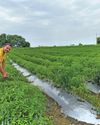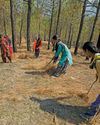
DESPITE BEING the epicenter of the mpox outbreak that has infected over 103,000 people across 122 countries since January 2022, the Democratic Republic of Congo (DRC) received its first batch of vaccines on September 5— nearly two years after the US and European nations began stockpiling them following their own cases.
So far, DRC has received 99,000 doses from the EU, with another 110,000 doses expected soon. However, these figures fall far short of the 3 million doses officials estimate are needed to bring the outbreak under control (see "The politics and economics of mpox', p44-45). Nigeria, the only other African country to secure vaccines, has managed to receive just 10,000 doses.
The World Health Organization (WHO) has declared mpox a public health emergency twice in the past three years-first between July 2022 and May 2023, due to its rapid spread outside Africa, and again on August 14, 2024, following a surge in cases across Africa, largely driven by mutations in the virus.
The mpox virus is categorised into two main clades: I, endemic to Central Africa, and II, which was previously known as the West African clade. Both have two subclades a and b. Clade IIb drove the 2022 global outbreak. The current spike in cases, however, is largely attributed to the more virulent clade Ib, which spreads through close contact and contaminated surfaces.
Bu hikaye Down To Earth dergisinin September 16, 2024 sayısından alınmıştır.
Start your 7-day Magzter GOLD free trial to access thousands of curated premium stories, and 9,000+ magazines and newspapers.
Already a subscriber ? Giriş Yap
Bu hikaye Down To Earth dergisinin September 16, 2024 sayısından alınmıştır.
Start your 7-day Magzter GOLD free trial to access thousands of curated premium stories, and 9,000+ magazines and newspapers.
Already a subscriber? Giriş Yap

THE CIRCULARITY ARGUMENT
A circular economy can help India achieve its developmental aspirations while following the low-carbon pathway. It will also help address the challenges of waste management, pollution and overexploitation of natural resources. Industries are already innovating to reuse high-volume wastes and have shown that the transition can usher in both environmental and financial windfalls

Banking on flawed drug voluntary licences
The Medicines Patent Pool is pushing for more VLs, but its bad deal with Novartis on a cancer drug shows the pitfalls

Lasting solutions
For the first time, the UN has recognised the role of indigenous communities in tackling aridity. A repository of traditional knowledge India has the wherewithal to lead the way

IMD at 150
India's journey into modern weather forecasting took a decisive turn 150 years ago with the establishment of India Meteorological Department during the British rule. The agency has come a long way since then, shaping the way the country predicts and responds to its diverse climate challenges

Every drop counts
In drought-prone Marathwada region, 14 villages have managed to counter water shortage by budgeting the resource

Threat to survival
Hollongapar Gibbon Sanctuary in Assam faces ecological challenges as railway electrification and hydrocarbon exploration endanger its fragile biodiversity

'Migration is going to be a battlefield'
AMITAV GHOSH is one of the foremost chroniclers of our times. His literary sojourn includes writings on topics that range from languages to climate change to human lives. His latest book, Wild Fictions, brings some of his works on these issues under one title. In a conversation with RAJAT GHAI, Ghosh shares his views on the future of human movement. Excerpts:

Face of future
California wildfires confirm forest fires are intensifying in a hotter world, emitting substantial amounts of greenhouse gases and reinforcing global warming

Friends of the forest
Residents of 30 villages in Uttarakhand establish a model for public participation in saving forests from wildfires

Climate-crazy playbook
Just hours after his second (and final) term began on January 20, US President Donald Trump unleashed 46 presidential actions. Several of these are centred on the US' climate commitments, energy transition, migration and trade policies, and are likely to have negative global implications